On the 24th of May, I attended the end of project Connecting Communities with Peatlands End of Project Conference at the Athlone Springs Hotel. The event was both a celebration of the extraordinary achievements of the Connecting Communities with Peatlands project and the communities it engaged and empowered.
Across eight counties and three years, the Connecting Communities with Peatlands project has worked to support communities in caring for their local peatlands. The talks from this event were a reminder of the local-to-global political challenge of Just Transition. They also demonstrate that Just Transition requires integrated governance and accessibility to support mechanisms for communities. The learnings from the Connecting Communities to Peatland project additionally demonstrated that on-the-ground communities play a crucial role in embracing change and creating an eco-social future.
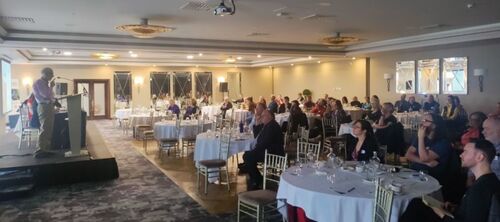
Guest Speakers set the tone
MC’d by environmental journalist Ella McSweeney, critical and constructive commentary was welcomed by the audience. Minister of State for Land Use and Biodiversity, Pippa Hackett described peatlands as a “wonderful national treasure” which should be looked at with national pride. Aoife Kirk, the Connecting Communities with Peatlands Coordinator, recounted how the project’s programme of mentoring, training, and peer-to-peer learning had provided communities with the competencies to take care of their local peatlands. She stressed accessible language and centering communities as crucial to the peatlands of the midlands restoration.
Kieran Mulvey, the former Just Transition Commissioner, described how Just Transition would require high-level localised projects, significant administration, practical knowledge, support from government, and adaptable and agile thinking. From Bulgaria, Stoyan Tchoukanov, member of the European Economic and Social Committee (EESC) and President of the Beef Breeders Association of Bulgaria, described how the closure of coal power plants and lignite mines in Bulgaria could cost up to 122,000 jobs. Tchoukanov described the transition as a Europe-wide civil society challenge requiring the EESC to engage with civil society community organisations. Mary Mulvey, secretary for Community Wetlands Forum CLG, emphasised community engagement as key to Just Transition.
Voices from the Peatland Communities
Several representatives of communities involved in the Connecting Communities with Peatlands described their experience with the project and the legacy it would leave.
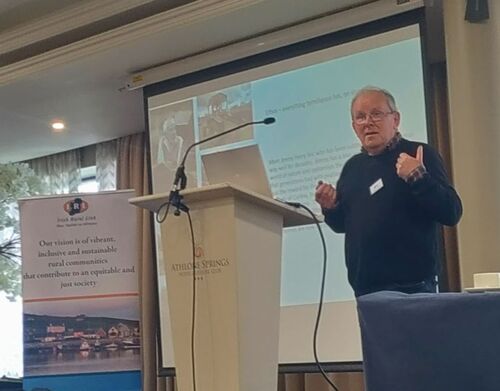
Eugene Dunbar, of ETHOS (Everything Tyrellspass Has, On Show) spoke of him and his community experience with the Connecting Communities with Peatlands Project
The room heard how the Community of Tyrellspass had negotiated with a private landowner to develop a boardwalk in Cloncrow Bog and restore the bog to a moth and butterfly habitat. At the Kilteevan Peatlands, sculptures and a restored Peat Hopper can be found along the Cloonlarge Bog Walk. The Lemanaghan bog is now used by its local community for Darkness into Light walks. “You could pay money to go to therapy… but to walk on the bogs… you get such peace” one community member said. Aoife Kirks’s work coordinating the project was applauded and appreciated throughout these talks.
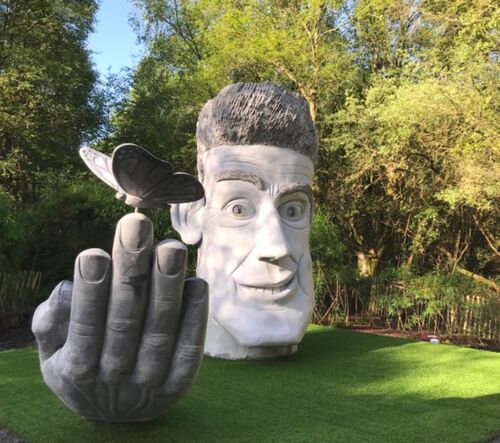
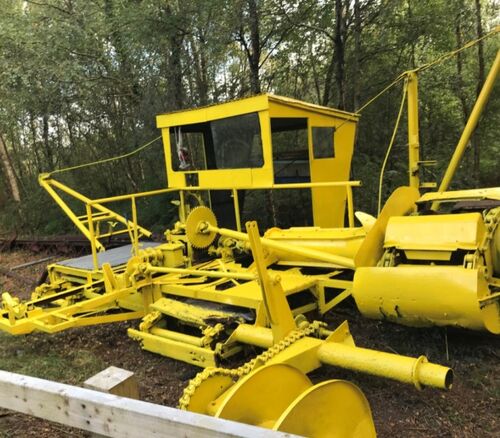
Sculpture of “Gulliver” and restored Peat Hopper found along the Cloonlarge Bog Walk. Photo credit: Kilteevan Tidy Towns
Sean Craven, a previous Bord na Mona worker, described how BnM workers don’t want their stories to be lost to history. For those who had worked for Bord na Mona, turf cutting provided their livelihood, allowing those workers to build their homes and raise their kids. Bord na Mona provided further economic support to these communities by helping to establish credit unions. In contrast, the ending of peat cutting led to a sense of placelessness in communities and a state of feeling “left in a bit of a limbo”. It was wished that the human stories of the Bord na Mona workers be remembered so the history of Peatland Communities is continuously celebrated.
Although there is an attempt to distribute the National Just Transition Fund holistically, Lawrence Fullam of Creative Rathagan Meitheal described how there an issue with Communities accessing Just Transition funding themselves. Róisín Greaney, Researcher at TASC, described how in the People’s Transition project, communities are developing their own Climate Solutions, such as Green spaces for mental health, repair cafés, Library of Things, and even ‘whole of community’ approaches to retrofitting. However, such bottom-up solutions face implementation challenges in coordination, collaboration, and accessing resources. Paula O’Rourke, Climate Action Officer at Kildare County Council, described how Just Transition had been added to Kildare’s Climate Action Plan and contributing to the foundations behind Maynooth’s decarbonisation zone. However, all these initiatives require support if transformative change is to happen at scale.
In the final session, Dr. Kate Flood facilitated a workshop on support needed for Just Transition. Despite the heavy themes throughout the day, as we grouped around our tables for discussion, the conversation was highly positive. The Peatland Communities were enthusiastic, welcoming, and joyful of their work. These smiling and warm-hearted faces made me feel welcome to the Peatland Community in turn.
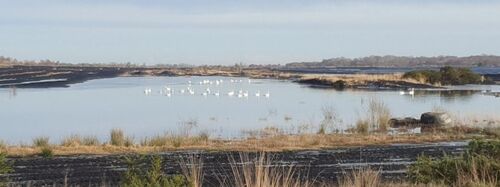
Photo shows lake formation over Lemanaghan Bog. Image credit: Ciara Egan, Lemanaghan Bog and Heritage Conservation Group
Personal Key Reflections
The diverse speakers came from different positions and represented several sectors and communities working on and part of a Just Transition for the Midlands and beyond. Below are my biggest personal takeaways.
Just Transition as Social Solidarity
As the low-carbon transition exerts additional pressure on communities, Just Transition is a challenge at both the international and local levels.
At the local level, the loss of livelihoods and cultures causes a need for local and regional solidarity. This must be tangible though. Greater resilience for local communities can be created through community engagement and cohesion but will also require economic backing in the creation of new localised livelihood streams. Support for this local level will require regional and national backing, and this will only occur if the human stories and the need for a Just Transition are recognised politically and across civil society.
However, this challenge is not just occurring in the Irish Midlands but across countries. Many areas which were reliant on the extraction of resources for their energy system and local livelihoods have not seen alternative investment. Just Transition as a global challenge consequently contends with other geopolitical issues. Decarbonisation can create immense amounts of social stress on households, communities, and whole regions as the shock from the loss of jobs coupled with the lack of new jobs creates economic instability. This economic and cultural instability is acting as additional pressure within regions, resulting in further political divergence and uncertainty. The War in Ukraine provides one of the more malignant examples of how the low-carbon transition must be contextualised within a wider set of geopolitical issues. With these discussions of geopolitical issues, the ongoing violence in Gaza was of course mentioned in this conference. At the local level, a Just Transition is seen as the key to building community resilience, stability, and solidarity. However, at the macro level, a Just Transition will be a test of both European and international solidarity.
Just Transition as Meaning-Making
Just Transition can bring meaning back to communities. Rural isolation, economic deprivation, and depopulation have left communities feeling left behind. Populations have both gathered and receded in areas according to cultural, economic, and industrial development. The low-carbon transition is not an outlier in these local histories: an energy system shift is creating demographic shifts across geographies. However, the task of Just Transition brings our attention back to the human experiences occurring in these areas. We must consider what spatial justice would look like for these communities and more importantly, what futures these communities would like for their areas.
Bringing focus and support back to these communities can empower them and leave them with a sense of meaning. “It matters that we mattered. A small crossroads village in Monaghan suddenly mattered” mentioned on member of the Peatland Communities. From feeling left behind to feeling like they matter – this is a significant shift in sentiment. These small rural towns can both take on new identities as well as retain their sense of continuity and belonging. They can retain their identities as Peatland Communities while also breathing new meaning into them as Communities who care for their peatlands – and the peatlands provide spaces of sanctuary for those communities in return. Those ecological bodies that were once resources for communities through extraction can take on new meanings as flourishing ecosystems and sources of pride for their local communities.
Just Transition as Local Governance
Across the talks, the question of local governance raised its head several times. Capacities for ecosystem restoration as well as the provision of administrative support were both part of this question. While training has been a question at the center of Just Transition, there has been little sign of any jobs to follow. Considering that Just Transition requires high-level tasks to be brought to fruition, a Just Transition workforce, and means of financing that workforce, will need to be developed.
From top-down policy, it was stated that the EESC should engage more with Group 3, also known as Civil Society Organisations’ Group. Alongside Group 1, representing “Employers”, and Group 2, representing “Workers”, these three groups are to represent the social and economic interests across European society. The ambition of engaging civil society however, requires that support for bottom-up initiatives be mobilised across governance structures. As mentioned by Lawrence Fullam during the conference, Just Transition is proving to be not completely transformational but time-bound and grant-led. This is generally understood due to national priorities having preference over local priorities. However, ensuring a more permanent Just Transition will require enduring and stable support for highly localised governance.
Alongside discussions on training, community ownership of peatlands also arose. These communities were demonstrating, and being trained in, how to care for their ecosystems and consequently bear all the hallmarks of being these peatlands carers. Moving ownership to these communities would ensure their continued preservation and restoration into the future as their local communities become their custodians.
Conclusion
Following the closure of Bord na Móna, ecosystems of the midlands have become politicised spaces. The loss of livelihoods and cultures of the midland communities invokes reflection on the necessities and struggles of life. As places of recent hardship, they become reminders of historical grievances. However, they also inspire hope as even with such commentary, the transformation in the relationship between peatlands and communities is harbouring meaning-making. These human experiences within transition demonstrate neighbourliness, custodianship, and social solidarity with one another. Mechanisms such as the Just Transition Fund and engagement with Civil Society Organisations across the European Union can help support bottom-up initiatives to thrive, grow, and last. If the Connecting Peatland Communities leaves behind hearts connected with habitats, then it has demonstrated Anáil na Beatha am t-athrú – Change is the breath of life.
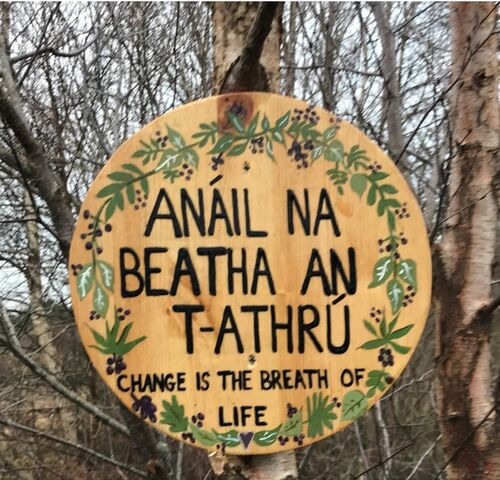
Image from artwork found at the Cloonlarge Loop, Kilteevan. Photo credit: Kilteevan Tidy Towns
Oscar Mooney

Oscar Mooney is a Research Assistant on UCD’s Just Transition Research Group and a PhD student in Trinity’s Geography Department researching 'Just Transformations of Land-use'. His research interests include forestry, land, legacy, and livelihoods. He has experience in grassroots activism, community-led and low-impact initiatives, and environmental advocacy.
Share:


